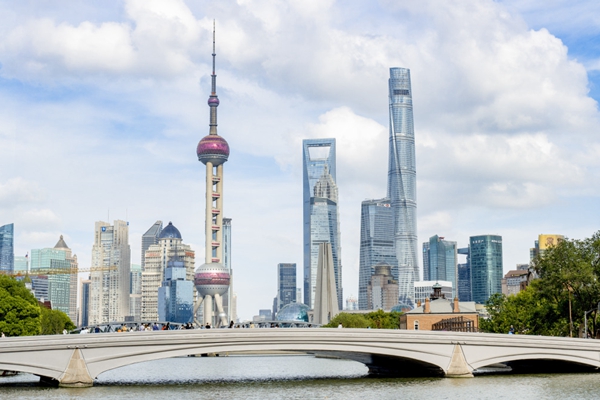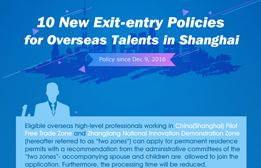Shanghai rises as hub for youth innovation and entrepreneurship

A view of Shanghai's Lujiazui area. [Photo/IC]
Shanghai's talent pool has been growing steadily, and the city has emerged as a magnet for Chinese graduates returning from overseas. Its appeal lies in its burgeoning reputation as a hotspot for young entrepreneurs and professionals eager to delve into cutting-edge industries, bolstered by its supportive policies and conducive environment.
Official data indicates that the city attracted 172,000 highly qualified professionals from across China and abroad in 2023, representing a 12 percent year-on-year increase. Shanghai has attracted over 310,000 Chinese graduates back from abroad over the years to pursue careers or entrepreneurial ventures in the city. It is now home to over 6.75 million highly qualified professionals and has issued 441,000 work permits to foreigners.
According to the 2023 Chinese Returnee Employment Survey Report released by Zhaopin, first-tier cities remain top choices for returnees. From January to May 2023, Shanghai, Beijing, Shenzhen, and Guangzhou attracted over 40 percent of people returning to China, with Shanghai ranking first.
The strategic industrial clusters and targeted initiatives in Shanghai play a pivotal role in attracting top talent. The city is actively fostering a hub of highly skilled professionals by implementing specialized development programs in key sectors like integrated circuits, artificial intelligence, and biomedicine. Moreover, Shanghai is channeling investments into emerging industries while championing innovation and entrepreneurship among the youth.
"I actually considered several cities during the early stages of starting my business, but ultimately chose Shanghai because I found it the most convenient place to find like-minded partners," said Li Mingrui, developer of mobile game Arknights and partner at Shanghai-based game developer Hypergryph.
Jin Xianmin, the founder of optical quantum computing firm TuringQ and a professor at Shanghai Jiao Tong University, set up his company in the NeoBay science and technology innovation park, which is a mere three-minute walk from Shanghai Jiao Tong University. Relying on Shanghai's pool of talent, he was able to quickly form a top-notch team of 150 people.
In a bid to fortify its support for budding talent in innovation and entrepreneurship, Shanghai is gearing up to unveil additional policy packages. The fifth Shanghai Y50 Forum for Innovation and Entrepreneurship, held on May 18, introduced the "Shanghai Youth Innovation and Entrepreneurship Support Program" and the "Shanghai Youth Innovation and Entrepreneurship Base".
The forum organizers divulged plans to amalgamate various support policies across sectors, encompassing initiatives like the "Innovation and Entrepreneurship Enterprise Support Policy", "Youth Support Policy", "Project Specific Incentive Policy", "Supporting Service Policy", and "Other Specific Functional Policies". These integrated measures aim to offer comprehensive guidance to young people from around the world flocking to Shanghai for innovative and entrepreneurial pursuits.
Shanghai is accelerating the construction of a high-level talent hub, strengthening the construction of strategic scientific and technological talent teams through top-level design, and introducing special talent cultivation plans for the three key industries of integrated circuits, artificial intelligence, and biomedicine. At the same time, it is actively making plans for a number of future industries, encouraging young people to innovate and start businesses. Data shows that Shanghai's talent pool has increased by 990,000 over the past five years to 6.75 million people.
Furthermore, Shanghai is enhancing its role in leading high-end industries and has already released new policies for future industries, laying the groundwork for new avenues and a plethora of application scenarios to empower innovative enterprises.
Pan Yukun, founder and chief executive officer of biotech startup Barbell Therapeutics, chose to establish his company in Shanghai's Zhangjiang Science City because of the industrial cluster in the region. Zhangjiang provides a range of support for startups, including equipment sharing and subsidies, which can help reduce the cost of starting a business.
At the recent "Pudong Innovation" competition for Chinese graduates back from abroad, Pan said that his team is accelerating the development of non-viral vector gene therapy in Zhangjiang, which is a new DNA vector platform technology that has the potential to address three major pain points in the field: vector capacity limitations, non-repeatability of administration, and high production costs. Since they often use instruments for experiments, the existing equipment in Zhangjiang reduces instrument costs for small and medium-sized enterprises in the early stages of development. After passing the assessment, companies can move in and start experiments the next day.
On the day of the competition, the "Pudong Innovation Global Incubation Friends Circle Plan" was launched. He Dajun, vice chairman and general manager of Zhangjiang High-Tech, said that they would bring partners from the entire industrial chain into the "Global Incubation Friends Circle". Startup companies have the technology but need more connections with upstream and downstream partners to find outlets for their products, refine their business models, find suitable investors, etc., all of which will be empowered within the "friends circle".
Li Mingrui, who started his business in 2014 and established his company in Shanghai in 2017, led his team to independently release their first independently-developed product, Arknights, in the domestic market. He told reporters that although Shanghai was a relative latecomer in the gaming industry, the inherent conditions for entrepreneurship, whether in finding like-minded partners who appreciate gaming culture or students with the skills to develop games, allowed the company to quickly find the partners it needs.
According to Shanghai's action plan for promoting future industries, the city will focus on the development of future health, intelligence, energy, space, and materials industries. By granting scientists autonomy and decision-making authority, Shanghai is fostering a climate conducive to unfettered exploration. The city aims to attract top-tier global talent, research teams, and innovative enterprises while instituting a market-oriented benefit and risk-sharing mechanism to expedite the industrialization of research and development endeavors. Leveraging platforms such as academician workstations and postdoctoral research stations, Shanghai is poised to track future technological breakthroughs, nurture innovative talent for future industries, and facilitate applications for diverse talent programs.
By 2023, Shanghai had a total of 242,700 graduate students in universities, with over 1,500 scholars selected for youth science and technology innovation talent development programs or incentive plans like "Oriental Talent" and "Bright Star Project", nurturing nearly 10,000 young innovative scholars.
As the role of enterprises in scientific and technological innovation continues to rise, it is crucial to identify potential entrepreneurs and growing startups among innovative talent, making startups an important part of development and ecosystem innovation in Shanghai and an essential element in building an international science and technology innovation center.
In recent years, Shanghai's innovation and entrepreneurship environment has continued to improve. Starting in 2017, Shanghai put forward the "Innovation and Entrepreneurship Service Capability Enhancement Plan", guiding and supporting various carriers towards "professionalization, branding, and internationalization". In 2020, the "Shanghai Innovation and Entrepreneurship Carrier Management Measures (Trial)" were issued, establishing a citywide innovation and entrepreneurship carrier cultivation system including technology enterprise incubators, maker spaces, and university science and technology parks.
Currently, Shanghai has high-quality carriers in various districts and industries, with notable support for youth entrepreneurship, such as the incubation base of the Shanghai Science and Technology Entrepreneurship Center, the NeoBay Global Innovation and Entrepreneurship Agglomeration Area, and the innovation ecosystem around Tongji University.
Yao Kai, director of the Global Science and Technology Innovation Talent Development Research Center at Fudan University, underscores the need for tailored support mechanisms for entrepreneurial ventures. From university student investment funds to angel investment funds in the nascent stages, and subsequent financial and service support as enterprises mature, a spectrum of support policies is essential to nurturing a thriving entrepreneurial landscape. Shanghai is witnessing a surge in recent graduates and seasoned individuals venturing into entrepreneurship, necessitating bespoke support policies to cater to their varied needs.
Qi Shi, chairman of the Shanghai Y50 Institute for Innovation and Entrepreneurship, advocates for a nuanced approach to support mechanisms across the city. By aligning recommendations with industry focus, youth-centric policies, and regional development priorities, Shanghai aims to bolster its foundation in youth innovation and entrepreneurship across districts. The selection of relevant parks to spearhead initiatives in areas like independent research and development of technological breakthroughs, technology transfer, enterprise incubation, scientific and technological services, and talent cultivation is poised to catalyze industry focus, support policies, and ancillary services.

 Print
Print Mail
Mail




